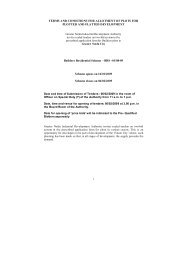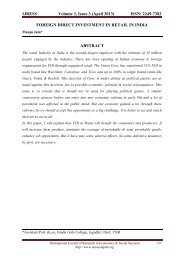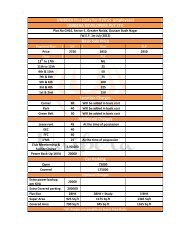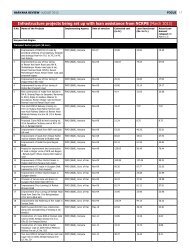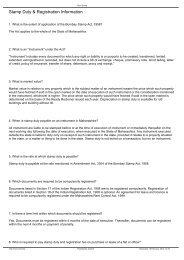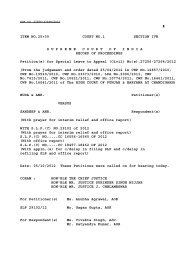eLegalix - Allahabad High Court Judgment Information System ...
eLegalix - Allahabad High Court Judgment Information System ...
eLegalix - Allahabad High Court Judgment Information System ...
You also want an ePaper? Increase the reach of your titles
YUMPU automatically turns print PDFs into web optimized ePapers that Google loves.
JUDGMENT/ORDER IN - WRIT - C No. 37443 of 2011 at <strong>Allahabad</strong> Dated-21.10....http://elegalix.allahabadhighcourt.in/elegalix/WebShow<strong>Judgment</strong>.doPage 109 of 19710/21/2011power can be exercised by the State. However, the Apex <strong>Court</strong> laid down that the revisional power can beexercised only within a reasonable time. Following was laid down in paragraphs 28 and 29 which are quotedbelow:-"28. The legislature in its wisdom did not fix a time limit for exercising the revisional power nor inserted the words"at any time" in Section 34 of the Act, 1976. It does not mean that the legislature intended to leave the orderspassed under the Act open to variation for an indefinite period inasmuch as it would have the effect of renderingtitle of the holders/allottee(s) permanently precarious and in a state of perpetual uncertainty. In case, it isassumed that the legislature has conferred an everlasting and interminable power in point of time, the title overthe declared surplus land, in the hands of the State/allottee, would forever remain virtually insecure. The <strong>Court</strong>has to construe the statutory provision in a way which makes the provisions workable, advancing the purpose andobject of enactment of the statute.29. In view of the above, we reach the inescapable conclusion that the Revisional powers cannot be usedarbitrarily at belated stage for the reason that the order passed in Revision under Section 34 of the Act, 1976, is ajudicial order. What should be reasonable time, would depend upon the facts and circumstances of each case."Recent judgment of the Apex <strong>Court</strong> in Banda Development Authority, Banda Vs. Moti Lal Agarwal & Ors, (2011) 5SCC 394 has also been relied by the learned counsel for the respondents. In the aforesaid case, there was adelay of 6 years between the passing the award and filing of the writ petition. Following principles were laid downin paragraphs 16,17,18,19 and 26 which are quoted below:-"16. In our view, even if the objection of delay and laches had not been raised in the affidavits filed on behalf ofthe BDA and the State Government, the <strong>High</strong> <strong>Court</strong> was duty bound to take cognizance of the long time gap of 9years between the issue of declaration under Section 6(1) and filing of the writ petition and declined relief torespondent No.1 on the ground that he was guilty of laches because the acquired land had been utilized forimplementing the residential scheme and third party rights had been created. The unexplained delay of about sixyears between the passing of award and filing of writ petition was also sufficient for refusing to entertain theprayer made in the writ petition.17.It is true that no limitation has been prescribed for filing a petition under Article 226 of the Constitution but oneof the several rules of self imposed restraint evolved by the superior courts is that the <strong>High</strong> <strong>Court</strong> will not entertainpetitions filed after long lapse of time because that may adversely affect the settled/crystallized rights of theparties. If the writ petition is filed beyond the period of limitation prescribed for filing a civil suit for similar cause,the <strong>High</strong> <strong>Court</strong> will treat the delay unreasonable and decline to entertain the grievance of the petitioner on merits.18.In State of Madhya Pradesh v. Bhailal Bhai, the Constitution Bench considered the effect of delay in filing writpetition under Article 226 of the Constitution and held: (AIR pp.1011-12, paras 17 & 21)"17.......It has been made clear more than once that the power to give relief under Article 226 is a discretionarypower. This is specially true in the case of power to issue writs in the nature of mandamus. Among the severalmatters which the <strong>High</strong> <strong>Court</strong>s rightly take into consideration in the exercise of that discretion is the delay made bythe aggrieved party in seeking this special remedy and what excuse there is for it.....It is not easy nor is itdesirable to lay down any Rule for universal application. It may however be stated as a general rule that if therehas been unreasonable delay the court ought not ordinarily to lend its aid to a party by this extraordinary remedyof mandamus.* * *21.The learned counsel is right in his submission that the provisions of the Limitation Act do not as such apply tothe granting of relief under Art 226. It appears to us however that the maximum period fixed by the legislature asthe time within which the relief by a suit in a Civil <strong>Court</strong> must be brought may ordinarily be taken to be areasonable standard by which delay in seeking remedy under Article 226 can be measured. The court mayconsider the delay unreasonable even if it is less than the period of limitation prescribed for a civil action for theremedy but where the delay is more than this period, it will almost always be proper for the court to hold that it isunreasonable."19. In matters involving challenge to the acquisition of land for public purpose, this <strong>Court</strong> has consistently heldthat delay in filing the writ petition should be viewed seriously and relief denied to the petitioner if he fails to offerplausible explanation for the delay. The <strong>Court</strong> has also held that the delay of even few years would be fatal to thecause of the petitioner, if the acquired land has been partly or wholly utilised for the public purpose.26. In this case, the acquired land was utilized for implementing Tulsi Nagar Residential Scheme inasmuch as





